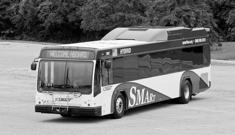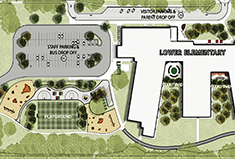SMART New Plan For Regional Travel
Story By : Sara E. Teller
DURING A MEETING HELD NOVEMBER 3RD TO consider a proposal to develop a regional mass transit system, the Suburban Mobility Authority for Regional Transportation’s (SMART) Board of Directors
approved a budget amendment designed to fund the new initiative, which includes stops along Michigan
Avenue, Woodward Avenue and Gratiot Avenue.
The service would specifically connect downtown Detroit with Metro Airport, Pontiac, Troy and Chesterfield Twp. Washtenew County has been excluded from the plan thus far, and details regarding specific stops along the route have yet to be determined. Some of the current destinations will be eliminated, but only those that cross new points along the grid.
“One of SMART’s most important objectives is to provide reliable transportation to get people to work,” said the company’s Marketing and Communications Director, Beth Gibbons. “By improving service throughout the region’s major corridors our ability to connect jobs with workers is enhanced, which could serve to attract businesses across the spectrum to locate or expand in South-East Michigan.” One of these prospects, a valuable consideration for the new transit system, is Amazon. The well-known marketplace has been scouting a location for its second headquarters, and SMART’s proposal may help to entice it and other big names to establish in the Detroit area.
Amazon has been undergoing a competitive site selection process, asking leaders of population-dense areas to submit their cities as headquarter candidates. In choosing the location, Amazon has specified a preference for metropolitan areas with more than one million people, a stable and business-friendly environment, urban or suburban locations with the potential to attract and retain strong technical talent, and communities that think big and creatively when considering locations and real estate options.
Wherever the marketplace decides to set up shop, the site is projected to create as many as 50 thousand new full-time positions for residents, with an average annual compensation exceeding $100 thousand dollars per employee. “Amazon has not released any feedback for submitted proposals that would provide any concrete information on the likelihood of selecting Detroit for the HQ2,” said Beth. Of SMART’s plan, she said, “We have received a variety of responses from the public regarding the proposed service changes. SMART has reviewed the comments, and made adjustments to better meet the needs of our riders.” Additional meetings to solicit feedback are scheduled.
Riders are especially looking forward to being able to connect to the Internetwhile in route. “Wi-Fi service will be available to rediers…on the new express starting January 1st” of this coming year, Beth explained. “SMART is planning to add additional amenities to a number of the stop locations along these corridors.” She added, “SMART’s current fares will still apply to the new service, at $2 dollars one way.”
Regional transit service will begin on January 1, 2018, with a projected annual cost of $14 million, which will fund all expenses related to operating the new system. “This includes wages and benefits for additional drivers, maintenance and IT staff, fuel and maintenance on the buses, and all other operational costs associated with the service running on the road,” Beth explained, adding, “When SMART successfully increased our millage from 0.59 to 1.0 mils in 2014, we committed to balancing our budget, signing new union contracts, and replacing our entire fixed route fleet of buses. Now that those objectives have been accomplished, we have a small amount of funding to reinvest sustainably in improving service. Using the funding to leverage additional federal and state grant funding, we are able to fund about $14 million in continuing, additional service into the future.”
Robert Cramer, Deputy General Manager and EEO/DBE Compliance Officer of SMART, said, “The design of the new service carefully balances the desire to limit the number of stops with the need to connect to as many mobility options as possible. More specifically, the stop locations are selected to connect to other SMART and DDOT routes, park and ride locations, the airport, the QLine, the People Mover, Amtrak Train Stations in Pontiac, Dearborn and Detroit, MOGO Bike Share downtown and Dearborn’s Bike Share along Michigan Avenue. Using only the very limited number of stops on these three routes, you can directly connect to over 92 per cent of all SMART and DDOT routes. The seven-day frequent nature of these routes and this emphasis on connectivity improves a person’s ability to get around the region significantly.” Dan Dirks, Director of Detroit Department of Transportation (DDOT) believes SMART’s plan will complement its current services. “This complements DDOT service, which is a benefit to DDOT customers and city residents,” he said.
Public hearings began on November 15th for anyone who wants to attend. Comments regarding the new initiative are also being accepted through November 20th at the SMART Administrative Offices, via phone at (313) 223-2100 or email at PublicHearing@smartbus.org.



